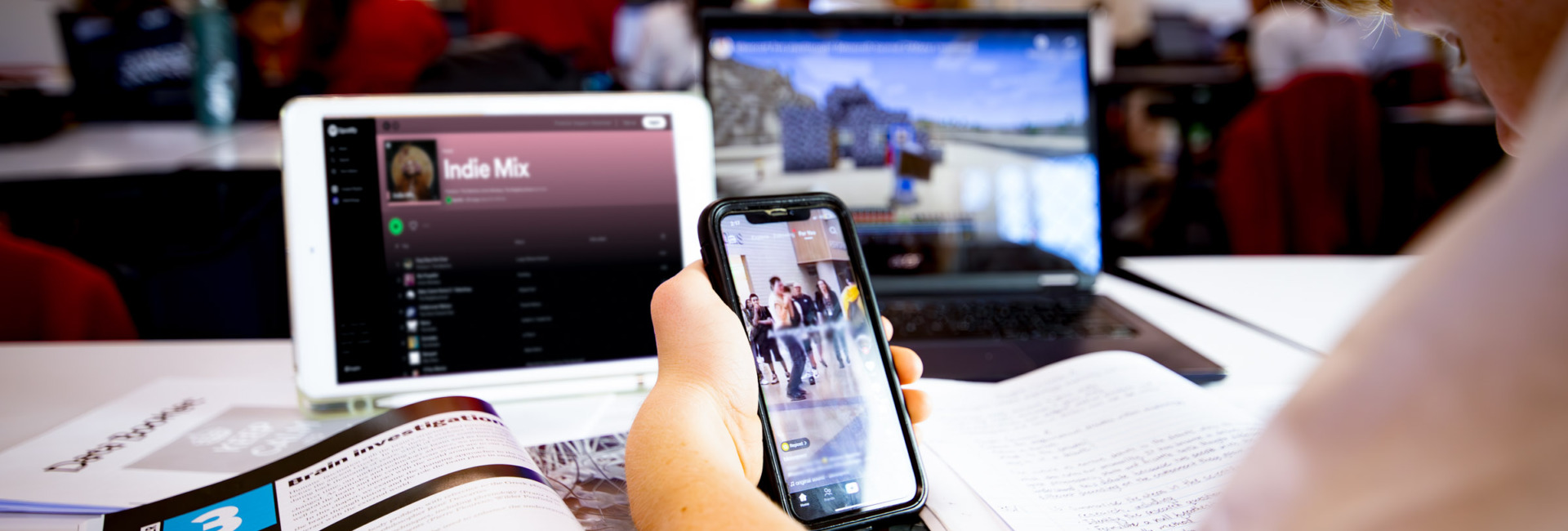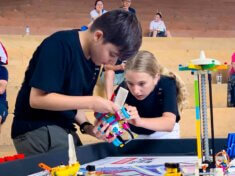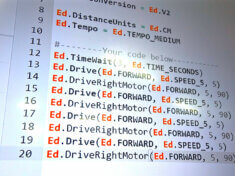Psychology students have been learning about divided attention and its impact on memory – particularly the encoding of new information – examining if technology or other distractions impact data retention.
The research task
In Year 11 at Suncoast Christian College, psychology students examined the impact of dividing research participants’ attention during class with an online reaction task. How it impacted both the memory retrieval and encoding stages was then measured.
One of their assessment tasks required students to use an experiment conducted in class and modify it to investigate their research question. The students have taken this original experiment and either redirected, extended, or refined the methodology. In teams of six, students develop a hypothesis, a research question, and an experiment they will conduct with other students.
The students recognised that technology could be distracting when studying (or encoding) new information. Subsequently, they changed the independent variable to one relevant to the research participants. For example, modifications included distracting participants with activities such as listening to a Tiktok audio track, watching a visual, funny video, or playing ‘Simon Says’ – all while the subjects were attempting to memorise a list of words. The aim – to measure what degree these distractions affected participants’ ability to encode information.
Craik’s appear
The students’ research task was inspired by the work of Fergus Craik (et.al.) who in this research The effects of divided attention on encoding and retrieval processes in human memory, examined the effects of divided attention (DA) at encoding and retrieval in free recall, cued recall, and recognition memory. Craik determined that during information encoding (i.e. when first learning new information), student learning is most impacted if distractions exist.
The psychology research processes
Upon conclusion of the experiment, the psychology students processed, analysed, and evaluated the data, and documented their findings in scientific reports. As is typical with academic and scientific reports, students commented on the limitations of their work and suggested areas of further research and improvement in methodology and application. This assessment task helped develop the students’ content knowledge in psychology and their scientific research skills.
Psychology Syllabus
At Suncoast, Psychology is an increasingly popular subject choice. The QCAA Psychology General Senior Syllabus states: “Psychology provides opportunities for students to engage with concepts that explain behaviours and underlying cognitions. In Unit 1, students examine individual development in the form of the role of the brain, cognitive development, human consciousness and sleep. In Unit 2, students investigate the concept of intelligence, the process of diagnosis and how to classify psychological disorders and determine an effective treatment, and lastly, the contribution of emotion and motivation on individual behaviour. In Unit 3, students examine individual thinking and how it is determined by the brain, including perception, memory, and learning. In Unit 4, students consider the influence of others by examining theories of social psychology, interpersonal processes, attitudes and cross-cultural psychology”
More Information
To learn more about Psychology in the Senior years, please visit suncoastcc.qld.edu.au/learning/senior-years/
The results: music to our ears?
The class was divided into three teams, all of whom found there to be a likely link between distraction of decreasing efficiency in information retention.
Neve Nott, Year 11 Psychology student on psychology: “In our study – where forty Year 7 students were subjected to a game of Simon Says while encoding two-syllable concrete nouns displayed on a screen – we absolutely can’t confirm that distraction does have an impact, however it’s likely the evidence suggests that it does”.
Summarising their experiment, in which background TikTok music played during encoding Neve stated: “We conclude that during studying, students should minimise the number of distractions, like having devices on or listening to music, especially if you are focused solely learning new information. Personally, I like listening to music when I do work purely so it drowns out all the distractions, and I think it’s about limiting the number of distractions”.
Student reflection
Thomas Robbins, Year 11 Psychology student: “The great thing about the experiment was the teamwork. The experience of knuckling down with my classmates – working together and then seeing the real results was a great outcome”.
Neve: “I found the research project enjoyable as it was very relevant to our age group and how it relates to my life as a student. I feel like many parents and teachers could use the results to argue that students should not listen to music while studying as it will likely be distracting”.
“What I find interesting is that I find it easier to study while listening to music and feel like I am being more productive, but the research says I am not.” Neve, Year 11 Psychology Student
Olivia Parsons, Year 11 Psychology student: “I find it interesting how the brain works and how each element of your mind and memory contributes to other things like activity. On a career in Psychology, Olivia comments: “I want to pursue a career in Law, and I believe that psychology would help in understanding the mind and how people think will be of huge benefit to me”.






